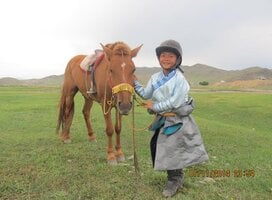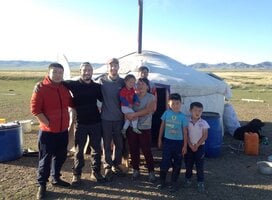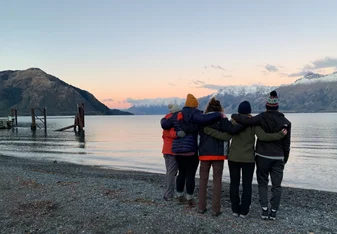Internships in Mongolia
Wedged between the giants of China and Russia thrives the fascinating country of Mongolia. Long gone are the days when Mongols used to be feared for their superior fighting and hunting skills; Mongolia today is revered for its hospitable and peaceful people. This is a land where tradition clashes with the turn of modernization. You will see the old mixing with the new and how through it all, tradition, customs, and culture live on.
Now is a prime opportunity to explore this rather untouched nook of the world. A great way to develop yourself and make a positive impact on the country is to journey to Mongolia on an internship placement. The idea of interns coming to Mongolia has starting to gain popularity and with this, a various selection of different programs.
Whether you are a current student wishing to gain practical experience or a working professional looking for another perspective, Mongolia is sure to provide insights into a world like no other. From working on a human rights case to herding yaks on the Mongolian steppes; it matters not where you are as there will be treasures of knowledge and experiences around every corner.
Journalism and Media
As a journalism/media focused intern in Mongolia, your options for work may include assignments for a newspaper, radio station or national TV station, depending on your abilities and interests. Your resume will be greatly enhanced by the practical skills you gain during your internship and you will have a large portfolio of work from your time abroad.
- Newspaper: Journalism internships are suitable for entry-level and seasoned professionals who wish to take a career-break or broaden their horizons. Newspapers have flourished since the democratic revolution in 1990; you will be working in a country where the idea of a free press is relished. There is the possibility of working with Mongolian newspapers where your work will be translated into Mongolian and used in the main body of the paper. You may even be asked to write your own regular column for the English language section
- Radio Station: Interns are given the opportunity to work as both presenters and behind the scenes. Imagine dabbling in the areas of production and/or broadcasting, or perhaps fronting your own chat show! You could be producing a radio show or out on the town searching out stories; either option lends you the opportunity to connect with local people and be the voice to your story, their story, or the combination of both.
- Television: The local staff are eager for you to bring new and exciting skills to the job along with your foreign ideas and perspectives. With cuttings and tapes to bring home, a Mongolian internship within the area of television is an interesting way to add something extra to your portfolio.
Healthcare
A healthcare internship in Mongolia can be more than an eye-opening experience. As an intern you will do a great deal of observational work alongside some of the most skilled and doctors in the country. The facilities are generally very basic serving patients who have often traveled vast distances to attend appointments and treatments. Healthcare internships in Mongolia are largely based in the capital city of Ulaanbaatar; you may be placed in busy hospitals or more specialized clinics. Your areas of focus may include dealing with pediatrics, maternity, or trauma patients.
- Public vs. Private: Your options for working in the healthcare industry in Mongolia include both the public and private sector. The public sector practices are typically 'Western' while the private sector practices may help broaden your medicine and healthcare experience due to the exposure to some traditional inspirations.
- Nursing and Midwifery: Whether you are fully qualified or just looking to gain initial experience, many internships in Mongolian Hospitals welcome those who would like to shadow nurses and midwives.
- Medical Elective Internship: In Mongolia, you can complete an elective in Medicine, Nursing or Midwifery. If this is the route you are able to pursue and choose, it is probable that you will be working in a large hospital in Ulaanbaatar. You will most likely shadow one of the experienced staff members who are knowledgeable at working with western medical and healthcare students. Be prepared for them to test out your knowledge along with giving you the benefit of their training and experience, as they are more than eager to exchange educated ideas.
Law and Human Rights
Not long ago, Mongolia was run by a government whose policies were very closely mirrored to the Communist model. However, a new democratic state and constitution were established in Mongolia; this turn of events has created an increasingly outward-looking country.
Participating in a Law and/or Human Rights internship in Mongolia will be a valuable addition to your resume when entering into this notoriously competitive profession. Most Law interns are expected to have some relevant experience and/or education. The ideal intern may be part way through a law course or have completed their studies, now wishing to gain first-hand experience overseas. The tasks may be varied while on your internship, ranging from conducting interviews, writing legal opinions, completing case research, or doing contract work.
You may be happy to know that there are still some options within grasp relating to Human Rights for those without experience. Many of the organizations you may be placed with are not-for-profit. You may find yourself networking with people from various organizations and running campaigns to raise public awareness about these different areas. The only pre-requisite for the path to success is a passionate interest in the area, lots of enthusiasm and are willing to work hard and potentially long hours.
Nomadic Placement
Forty percent of the population in Mongolia comes from nomad families. These families wander the countryside – more commonly referred to as the Mongolian steppes – on camels or horses, herding their livestock, living from the land, and connecting their daily life and activities with Mother Nature. This type of opportunity allows you to learn about a very unique group of people and their ancient way of life, one that is still fairly untouched by the urban centres of Mongolia and the rest of the modern world. It is also a good opportunity to gain experience with looking after animals such as goats, cows, yaks and horses.
Below are some of the animals you can expect to work with and the products you will help to produce:
- Horses: Airag and transportation.
- Yaks: Meat, leather and milk. Dairy products such as yoghurt and cheese.
- Sheep: Meat and milk, skins, wool and felt.
- Goats: Mongolia is one of the world’s largest producers and exporters of cashmere.
- Two humped Bactian camels: Meat, milk, wool, riding and transportation.
When and Where to Look for an Internship
Because of the various internship options here, the possibility of landing a position is quite high. Some internships may require a more lengthy application process or specialized requirements, but opportunities exist especially as Mongolia is often overlooked in terms of foreign travel and interested interns.
A good place to start your search is with The United Nations Development Programme (UNDP). The UNDP Mongolia Internship Programme is offered to a small number of national and international students (preferably 3rd or 4th year students) as well as university graduates who are enrolled in a master’s degree program.
Internship placements may vary in length, depending on availability, education and experience requirements, and of course the needs of UNDP Mongolia. “Interns specialize in the areas of democratic governance, environmental policies, poverty reduction and other activities related to sustainable human development. In doing so, they will acquire practical experience in various aspects of project management in an international work environment.”
Cost of Living in Mongolia
US dollars and credit cards are accepted in most hotels and some restaurants, mainly in Ulaanbaatar. US dollar traveler’s cheques are accepted at some hotels and can be converted at several banks. Carry local currency, especially in rural areas; the Mongolian currency is called the tugrik.
The average salary in Mongolia varies from $300 to $400 USD, but it is also possible that your internship will be unpaid. This is definitely a ‘break-even’ or a ‘save-before-something-to-intern’ type of country. As a local, prices are reasonable and not above what one can afford, but as a foreigner, be prepared for artificially inflated prices (non-Mongol priced items) without the salary to back it up. With that being said bargaining is widely accepted and is a probable way to secure items you may have your eye on.
For the financially prepared travelling intern, US $15-$20/day gets you a one night stay in a guesthouse which typically includes a hot shower, laundry, internet services, and access to experienced tour guides. An alternative as well as a great way to save some of that ever-so-precious traveller’s moolah, try arranging for a homestay where not only will you save on some coin, but your experience may be much more valuable and the cultural insights plentiful. Maybe go one step further and consider a Nomadic Placement as your Mongolian internship.
Work and Labor Laws in Mongolia
Mongolia stipulates that any foreigner traveling to this country must present a passport valid for at least six months beyond the date of entry. Whether the purpose of travel is leisure, business, or studies, a visa is also required; furthermore, travellers arriving in or departing from Mongolia through China should also be aware of the Chinese visa regulations.
Overland entry into Mongolia, other than by train, must be authorized by the Head of the Consular Section at the Ministry of Foreign Affairs and Trade, with requests specifically addressed to the Head of the Consular Section. Visitors must register with the Office of Immigration, Naturalization and Foreign Citizens within one week upon arrival if they are staying for more than 30 days.
When travelling to any country, it is always important to educate yourself on the local laws, customs, and health and safety measures. Mongolia is an extremely unique country with plenty to keep in mind during your journey; the following points will help along your way:
- Demonstrations occur and have the potential to suddenly turn hostile. Avoid all demonstrations and be vigilant in areas where there are large crowds and gatherings.
- Traffic drives on the right. Road conditions are poor. Driving can be hazardous, especially in rural areas. Drivers have little regard for traffic regulations and do not follow safe driving practices. Accidents occur frequently. Access to rural areas can be hampered by heavy snowfalls during the winter months.
- The use of public transportation and regular taxis is considered to be unsafe. Use licensed taxis equipped with meters, regardless of the distance of the journey. Make arrangements for taxi service through a reputable source.
- The standard of medical care is low and local facilities are limited. A few hospitals in Ulaanbaatar cater to foreigners, but they suffer from a shortage of safe medicine and reliable medical staff.
- Bring basic medical supplies, such as antibiotic ointment, bandages, diarrhea medication, a laxative, aspirin and contraceptives, as they may be difficult to find.
- Tap water is not potable. Bottled water is available in urban areas.
- Air pollution is acute, especially in industrialized areas. Take this health risk into account if you suffer from respiratory problems. You may also experience some health problems associated with high altitudes.
- Be aware of the dangers of hypothermia as temperatures can drop to minus 35 to 40 degrees Celsius in winter.
- Exercise caution in crowded areas, including open-air markets, the central post office and the Gandan Monastery, as well as when using public transportation.
- Individual travellers have been harassed at border crossings. Thefts occur frequently on trains between Mongolia and Russia.
- Touching during conversations should almost be expected. The only “inappropriate touching” one should avoid as it is considered lewd is touching people’s legs.
- It's considered derogatory gesture to point a person. One should use the whole hand instead.
- Putting your thumb in between your middle and index finger while making a fist is an obscene gesture. It's the Mongolian version of giving someone the middle finger.












